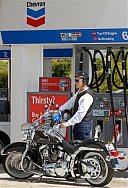Entered into the database on Sunday, January 29th, 2006 @ 09:52:35 MST
Chevron Fourth-Quarter Earnings Rise 20 Percent to Company Record of
$4.14 Billion Chevron Corp.'s fourth-quarter profit climbed 20 percent to $4.14 billion,
a company record that continued the most prosperous stretch in its 126-year
history as the oil company capitalizes on high fuel prices that are squeezing
consumers and ruffling politicians. Its profit of $14.1 billion for the full year was also a record for Chevron.
It now has posted record annual profits in each of the last two years, earning
a combined $27.4 billion. The San Ramon, Calif.-based company's earnings for 2005's final quarter, released
Friday, represented the most it has made in any three-month period since its
inception in 1879. The performance edged the $4.13 billion earned during the
second quarter of 2004 the early stages of a two-year boom. Oppenheimer & Co. Fadel Gheit believes Chevron will set yet another new
earnings record this year as the company continues to mine crude oil prices
that are expected to remain above $60 per barrel. "We are only scratching
the surface," Gheit said. "In my view, this company is hitting on
all cylinders." The windfalls that Chevron has been generating aren't unique in its industry.
Exxon Mobil Corp., the world's largest publicly traded oil company, earned nearly
$10 billion in the third quarter and may top that performance when it releases
its fourth quarter results Monday. Chevron's latest quarterly profit, translating to $1.86 per share, compared
with net income of $3.44 billion, or $1.63 per share, in the comparable 2004
period. Revenue totaled $53.8 billion, a 26 percent increase from $42.7 billion in
the comparable 2004 period. Despite the robust gains, the quarterly earnings fell 3 cents below the average
estimate among analysts polled by Thomson Financial. Chevron's shares fell 21 cents to $60.01 in midday trading on the New York
Stock Exchange. For all of 2005, Chevron's $14.1 billion profit amounted to $6.54 per share,
topping its previous highest annual profit of $13.3 billion, or $6.14 per share,
established in 2004. Last year's gains partially reflect Chevron's increased
size after completing a $17.8 billion takeover of Unocal Corp. in August. The Unocal acquisition increased Chevron's supply of oil and natural gas, better
positioning the company to take advantage of energy prices that have been driven
up by steadily rising worldwide demand and Middle East turmoil. Last year ended with crude oil selling for about $61 per barrel, up from about
$45 per barrel at the beginning of 2005. Meanwhile, natural gas prices finished
2005 at about $10 per thousand cubic square feet, up from $6 at the year's outset. Energy companies like Chevron have been reaping unprecedented profits from
those increases, outraging U.S. lawmakers as they try to placate consumers who
have had to change their spending habits to pay higher gasoline and heating
bills. After announcing large earnings increases in the third quarter, the top executives
from Chevron, Exxon Mobil and three other major oil companies were summoned
to Congress, where they tried to dissuade lawmakers from imposing a windfall
tax on the industry's profits. Chevron's 2005 profit would have been even higher last year if not for extensive
damage to its Gulf of Mexico operations caused by Hurricanes Katrina and Rita
during August and September. Those devastating storms hobbled a major Mississippi oil refinery, as well
as the Chevron's natural gas production, preventing the company from fully cashing
in on the market conditions. Chevron estimated the decreased production in the Gulf of Mexico lowered its
annual profit by about $1.4 billion, with about half the loss occurring during
the fourth quarter. Gheit estimated the fourth-quarter production setbacks trimmed
Chevron's earnings by about 31 cents per share. The company has since repaired most of the storm damage, but its production
continues to lag below levels before the hurricanes. Until Katrina struck, Chevron's average oil production in the Gulf of Mexico
averaged about 300,000 barrels per day. In fourth quarter, the average fell
to about 160,000 barrels per day. This year, Chevron expects to average about
200,000 barrels per day in the Gulf. Somewhere between 10,000 and 20,000 barrels of production lost last year's
hurricanes probably will never be restored, Chevron executives told analysts
during a Friday conference call. Despite its difficulties in the Gulf of Mexico, Chevron expects its oil production
to average between 2.7 million and 2.8 million barrels per day, up from 2.5
million barrels per day during 2005. Chevron's recent success has enriched its shareholders as the company's stock
price has climbed by nearly 40 percent since the end of 2003. At the same time, Chevron and other big oil companies have been trying to dispel
perceptions that their soaring profits are unconscionably high. The U.S. oil and gas industry has recently cited data showing it makes about
$8 per $100 in sales well below banking, pharmaceutical and high-tech companies,
which all make an average of at least $15 per $100 in sales. Chevron and other oil companies also are emphasizing that they plan to spend
substantially more during 2006 on the exploration for more oil a search that
ultimately could increase supplies and reduce the pressure to raise energy prices
even further.
